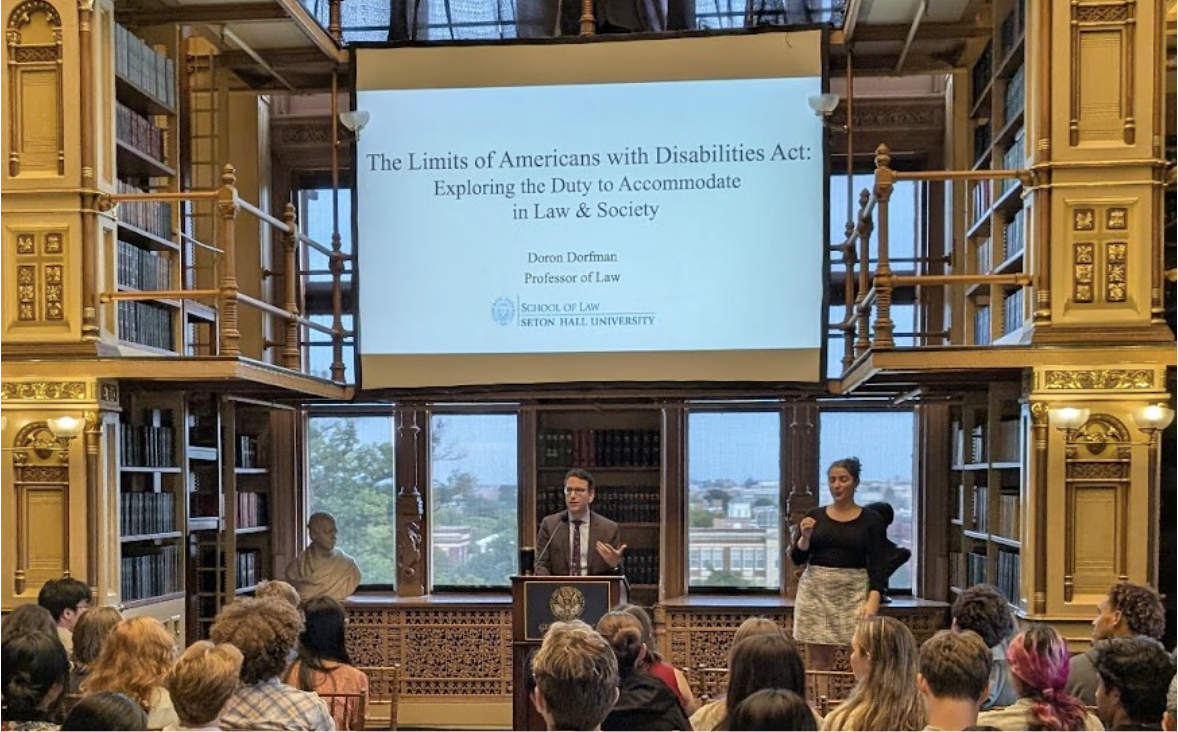Maria Renske “Marietje” Schaake, international director of policy at Stanford University’s Cyber Policy Center, international fellow at the University’s Institute for Human-Centered Artificial Intelligence and member of the European Parliament from 2009 to 2019, warned about the political threat Big Tech poses in a discussion of her recently released book, “The Tech Coup: How to Save Democracy from Silicon Valley” at Georgetown University’s Capitol Campus on Sept. 27.
“The Tech Coup” explores the evolving relationship between technology and power, offering a critical view of leading technology companies’ influence on democratic institutions. The talk was moderated by Laura DeNardis, inaugural endowed chair in technology, ethics and society and professor in the department of communication, culture and technology.
Schaake said that she wrote the book in response to the growing power of tech companies and the inability of democratic governments to regulate them.
“‘The Tech Coup’ talks about the space that tech companies have taken and have been given by democratic governments, but that has led to a power grab and erosion of agency on the part of the democratically elected and democratically appointed,” Schaake said at the event.
While Schaake faults tech companies for their overexertion of power, she believes that governments are partially responsible.
“I think politically speaking, we have to agree that politicians from the Democratic and Republican parties, and in other parts of the world from the left and the right, have put too much faith in market forces, in the hope that the technologies themselves would lead to democratization and would sort of render the best results without needing to place guardrails, without needing to place these checks and balances that we actually have in almost every other part of our society,” Schaake said.
The conversation touched on the recent ban of social media site X, formerly known as Twitter, in Brazil due to disagreement between the Brazilian government and Elon Musk, owner of X. While this development came after the writing of her book, Schaake emphasized that it provides a valuable lesson on how governments can counteract the power technology companies possess.
“What the Brazilian case shows us is that if the democratic state wants to assert itself, and really double down on enforcing the law, it can,” Schaake said. “This, of course, presumes that there is a legal framework, and my critique in ‘The Tech Coup’ is that oftentimes there are not updated laws.”
A collaboration between technology, ethics and policy is crucial to solve the problem laid out by Schaake, according to DeNardis.
“All of the problems in tech and society require an interdisciplinary framework,” DeNardis told The Hoya. “You have to have an understanding of the technology itself. You have to have an understanding of the quantitative and qualitative methods that we can use to study, including data science, including computer science, including various social sciences. And you have to have that legal framework. You have to understand human rights.”
DeNardis believes that educating Georgetown students on digital ethics issues is particularly important because of Georgetown students’ dedication to the collective well-being.
“Georgetown students are, more than any students I’ve ever interacted with, interested in the common good, and they have an ethical framework or approach to life,” DeNardis said.
Sanad AlKhatib (CAS ’28), who attended the event, expressed interest in using the ideas articulated in “The Tech Coup” to determine how governments can navigate the complexities of integrating new technologies into existing infrastructure.
“In the future, I want to look at how we can work with governments and, often, these very powerful policymakers to navigate how you can bring technology into a country and how you can sort of supplement the infrastructure so that the technology fits in,” AlKhatib told The Hoya.
Schaake concluded the book talk by highlighting the pressing need for stronger oversight and public awareness in the rapidly evolving tech landscape.
“There’s such an imbalance right now, a lack of independent oversight, a lack of accountability and often a lack of insight on the part of the public into how technologies work,” Schaake said.




